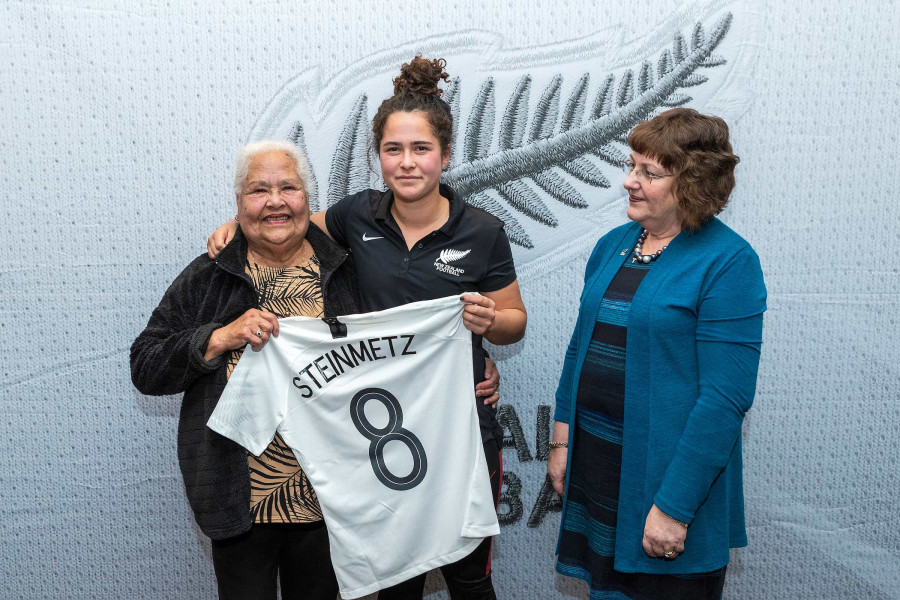Beyond the pitch
Beyond the pitch

(Picture caption: Malia Steinmetz, who is of Samoan descent, and her grandmother at her FIFA U-20 Women's World Cup 2018 shirt presentation, with New Zealand Football President Johanna Wood. Photo Credit NZ Football.)
Hundreds of thousands of people across the country benefitted from the government’s leverage and legacy programme for the FIFA Women’s World Cup 2023™.
A report released by the Ministry of Business, Innovation and Employment (MBIE) highlights more than 50 projects delivered as part of the programme and the outcomes they achieved.
In July last year, the Ministry for Pacific Peoples, in partnership with MBIE, launched the Puawānanga Pacific Aotearoa Wāhine Fund, as part of the legacy programme.
It targeted Pacific wāhine (groups and individuals) to help them overcome barriers limiting their ability to take part in recreation and sports.
The individual grants were awarded to five Pacific women of up to $10,000 each to support advancement in their chosen field or career, allowing them an opportunity to upskill in their chosen career pathway through study, development opportunities, or on the job training.
Additionally, 22 community groups and organisations received funding, and delivered initiatives with a component relating to addressing period poverty.
Kylie Hawker-Green, Major Events Manager for MBIE, says the report shows the broader impact co-hosting the event had for Aotearoa New Zealand.
“The FIFA Women’s World Cup is one of the biggest sporting events in the world and we knew that co-hosting the event here in Aotearoa New Zealand provided us with a unique opportunity to create lasting change for our communities, both on and off the sports field,” Kylie says.
“To achieve this and to ensure we got the most out of co-hosting the event, MBIE led the development of a comprehensive leverage and legacy programme alongside 24 other government agencies and partners.
“As a result of the leverage and legacy programme, we were able to achieve incredible things such as putting 30,000 school students through a programme that helped them learn about the world through football, carrying on the legacy of using poi in stadiums to celebrate and show support for our female athletes, and helping to grow trade connections with our co-host Australia through the first ever all-wāhine trade mission.”
Along with the initiatives delivered through the leverage and legacy programme, upgrades to 30 sporting facilities across the country were made.
The upgrades involved pitch, lighting and facility enhancements, stadia overlay and gender-neutral changing spaces.
“The upgraded sporting facilities are a key legacy of the FIFA Women’s World Cup.
“Communities and different sporting codes that use these facilities will benefit from them for a long time,” she adds.
FIFA, New Zealand Football, and the Host and Team Base Camp Cities also delivered a range of leverage and legacy activities during the tournament.
An economic evaluation impact report released by MBIE in December shows the FIFA Women’s World Cup 2023™ delivered a net benefit to Aotearoa New Zealand of $109.5 million and for every dollar spent on the tournament, the return to New Zealand was $1.34.
Visit the MBIE website to view a list of Puawānanga Pacific Aotearoa Wāhine Fund projects and for more information.
